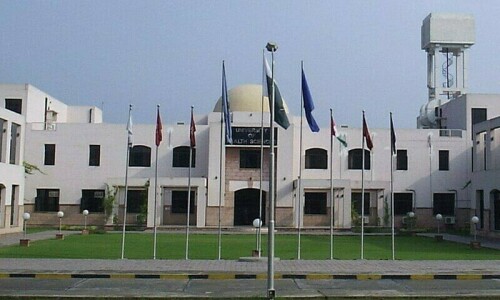LAHORE: Despite claims to the contrary, the Punjab government continues squeezing its Ramazan flour subsidy regime (quantity of wheat and money) with each passing year, and it terminated the package at Rs1.7 billion against allocation of Rs5 billion this year as well.
The food department officials maintain that progressive early termination of the package is linked to the market realities, rather than official commitment. “With each passing year, the holy month is getting closer to wheat procurement drive, when market is full; so, the millers don’t need official wheat for their operation,” they say.
The millers, however, disagree. “The department has restricted its supplies to Ramazan bazaars only. Even for these bazaars, the supplies are fully squeezed. The lesser an officer issues wheat to millers, the more efficient he is rated by the department. The releases are made so cumbersome that millers prefer going to the open market rather than running after each bag to be issued, then followed through the entire milling and selling process by the department. The subsidy regime has thus shortened, both in quantity and finances.”
Last five years’ departmental data reflects the declining trend. In 2009, which was an exceptional year and the department had more than enough stocks, it released 399,000 tonnes of wheat to millers under the Ramazan package and spent Rs8.43 billion on subsidy. However, next year (2010), the quantity dropped to 300,000 tonnes and subsidy to Rs3.1 billion. In 2011, wheat came down to 273,000 tonnes and subsidy to Rs2.6 billion. In 2012, wheat releases were 221,000 tonnes and subsidy Rs2.9 billion. Last year, wheat releases were only 200,000 tonnes and subsidy was Rs1.8 billion. This year, wheat releases terminated at 180,000 tonnes and subsidy money at Rs1.7 billion.
The difference created between the Ramazan package 20Kg bag and the market also reflects, more or less, the same pattern. In 2009, Punjab took a hit of Rs275 per bag – Rs200 in Ramazan bazaar against Rs475 in the open market. In 2010, the difference was Rs185 per bag – Rs285 against Rs400 in open market. In 2011, it came down to Rs110 per 20Kg bag – Rs415 in Ramazan bazaar against Rs525 in open market. In 2012, the difference was Rs115 – Rs460 and Rs570. In 2013, it was Rs100 – Rs630 and Rs730. This year, the difference was Rs140 – Rs620 in Ramazan Bazar and Rs760 in the open market.
“There are basically two problems,” says a former official of food department. “One of them related to policy; the government, as a matter of policy, is doing away with general subsidy and trying to focus on the targeted one. So, the squeeze is in natural corollary. The second is related to political mileage. Despite preparing and having a policy to the contrary, the provincial government is still not ready to compromise on political mileage. It still announces a hugely inflated package that it knows it will not implement. Even this year, it announced Rs5 billion package, knowing well it never spent that sum in the last five year. It still announced the package, built a media hype around it and then quietly told the department to put a severe squeeze on releases.
“The entire field formation was told to bring releases to bare minimum and subsidy money would automatically come down,” he said and concluded: “In the last five years, the wheat releases target has been around 450,000 tonnes and subsidy amount Rs5 billion. Both of them never achieved. It was same this year. There is a policy shift and the sooner the Punjab government comes clean on it, the better it would be. Otherwise, the dichotomy would continue to invite criticism form the media and the critics.”
Published in Dawn, August 5th, 2014













































Dear visitor, the comments section is undergoing an overhaul and will return soon.